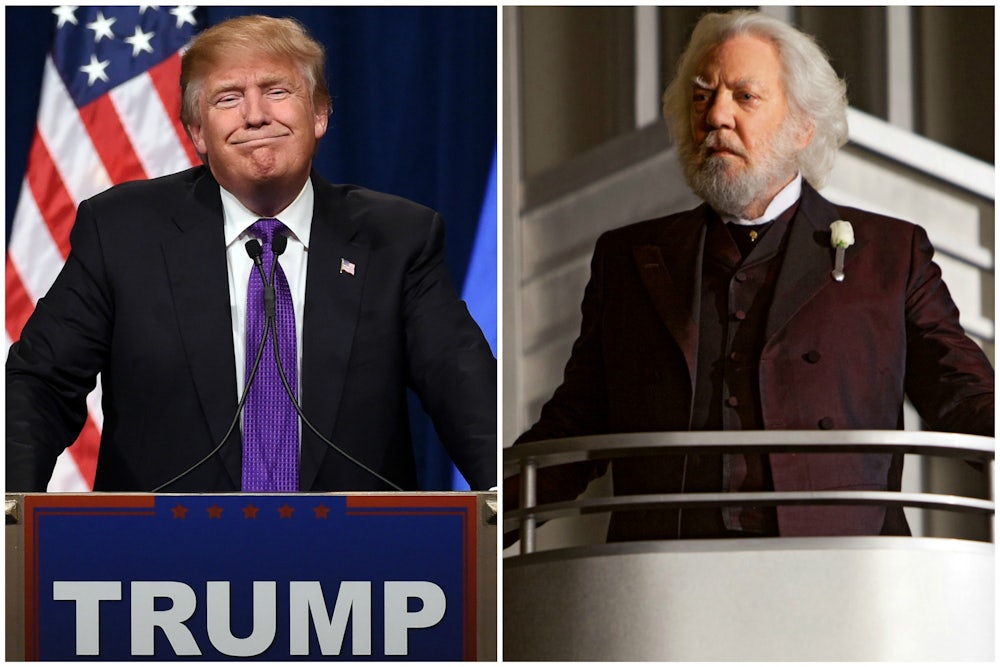Earlier this month, in a final sketch as President Barack Obama’s ever-exasperated “anger translator” on The Daily Show, comedian Keegan-Michael Key compared the dawn of Donald Trump’s presidency to a certain popular book-cum-movie franchise.
“Don’t y’all understand?” Key shouted to the camera. “This is how The Hunger Games starts!”
Well, not quite. No one thinks the Trump administration will transform the U.S. into Panem, Suzanne Collins’s post-apocalyptic North America where a totalitarian government forces children to fight to the death on national television. Still, a number of Trump’s critics have noted some legitimate parallels between him and The Hunger Games since he launched his campaign.
Vox explained “How The Hunger Games anticipated Donald Trump’s rise,” the commonality being that “in our culture, a really strong, compelling narrative trumps everything, every time, no matter what side you’re on.” Jezebel declared that Trump’s victory tour was “Literally a Plotline From The Hunger Games.” And New York Times columnist Ross Douthat floated Sean Hannity as Trump’s own Caesar Flickerman, the flamboyant state television broadcaster played by Stanley Tucci.
Even an actress from the film made the comparison.
“Some of you know me from The Hunger Games, in which I play Effie Trinket—a cruel, out-of-touch reality TV star who wears insane wigs while delivering long-winded speeches to a violent dystopia,” Elizabeth Banks, a Hillary Clinton supporter, said at last year’s Democratic National Convention. Referencing the Republican National Convention, she added, “So when I tuned in to Cleveland last week, I was like, ‘Hey! That’s my act.’”
Despite such parallels, The Hunger Games ultimately is the wrong way to conceptualize life under Trump.
Tom Pepinsky, a government professor at Cornell University, recently argued that Americans conceive of authoritarianism in a “fantastical and cartoonish” way, and that popular media—especially film—is to blame.
“This vision of authoritarian rule,” he wrote, “has jackbooted thugs, all-powerful elites acting with impunity, poverty and desperate hardship for everyone else, strict controls on political expression and mobilization, and a dictator who spends his time ordering the murder or disappearance of his opponents using an effective and wholly compliant security apparatus.”
That portrait of totalitarianism more or less describes Panem in Collins’s world, and certainly wouldn’t be unfamiliar in Nazi Germany or contemporary North Korea. It’s just not a picture of how authoritarianism would come to the United States, and Pepinsky—who titled his essay, “Everyday Authoritarianism Is Boring and Tolerable”—worries media portrayals prevent Americans from being prepared for the way it might actually arrive.
“If you think of authoritarianism as only being The Hunger Games and Star Wars, you’re likely to focus on the wrong types of threats to democracy,” he said in an interview. “You’re out there looking for something unlikely to happen and you’re missing the things much more likely to happen.” Such as legal gerrymandering, he said. “One way to not lose elections that’s very common and essential to Malaysia is the construction of so many safe legislative seats that the party doesn’t need to get most of the voters to get most of the seats.”
Another expert on authoritarianism, though, argues that The Hunger Games is particularly instructive for this moment in America.
“The Hunger Games is actually a very important book to read in terms of understanding Donald Trump, because he’s part of an entertainment complex,” journalist and academic Sarah Kendzior said in an interview. “That’s essential to how he got to power, his use of spectacle and media.”
Kendzior rightly added that the Hunger Games’ commentary on reality television—“in which people are humiliated and empathy erodes”—is in fact a vital message for the moment. “Trump, in the midst of a recession, was gleefully telling people they were fired on national TV,” she said, “and others like it because they were not the ones getting fired for once.”
In The Hunger Games, Panem suffers from extreme inequality based on geographic divides, wherein the citizens of impoverished districts are forced to provide for the lavish lifestyles of their Capitol overlords. In the Times, Douthat likened this dynamic to wealthy Washington profiting from public funding while the bulk of America struggles financially. Kendzior, who lives in the Rust Belt city of St. Louis, Missouri, drew a similar analogy. In fact, she said she always jokes with friends and neighbors that they live in District 12, the home of heroine Katniss Everdeen (played by Jennifer Lawrence). “It’s a joke,” Kendzior added, “but it’s not that funny when people really are struggling for survival.”
She further argued that the televised bloodshed of The Hunger Games isn’t so far removed from the real-life synergy in America between violence and for-profit media outlets, for whom crime and punishment is such big business. (She gave the example of Ferguson, Missouri, where national television broadcast riots extensively after the 2014 Michael Brown shooting but has generally spent little time.) And there’s no question Trump will try to distract Americans from the various sins of his administration with made-for-TV conflicts and controversies.
“Does that mean we’re going to have a reality TV show in which people fight each other to the death?” Kendzior said. “I sure as hell hope not. But I wouldn’t be surprised if there’s an extension of the same culture that book was based on.”
Kendzior agrees with Pepinsky that Trump-style authoritarianism won’t look like it does in other countries. The question, then, is how to make Americans care about the incremental degradation of constitutional values and political norms. That responsibility will fall to the press, which would do well to dispense with easy fantasy-film references. There’s nothing fictional about the threat we’re facing.
